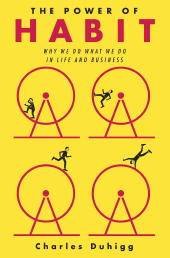Are Habits More Powerful Than Decisions? Marketers Hope So.
The science of how we develop habits is used by companies both to mold consumer preference and to shape company culture. Details from Charles Duhigg, author of “The Power of Habit.”
Topics

The science of how we develop habits is used by companies both to mold consumer preference and to shape corporate culture.
Habits are powerful forces, and companies are using those forces when interacting with customers and employees.
“Over the past two decades, the science of habit formation has become a major field of research in neurology and psychology departments at hundreds of major medical centers and universities, as well as inside extremely well financed corporate labs,” wrote Charles Duhigg, a New York Times staff writer, in “How Companies Learn Your Secrets” in February.
Duhigg is everywhere these days, talking about his new best-seller “The Power of Habit: Why We Do What We Do in Life and Business (Random House, 2012). It’s a fascinating topic: habits, rather than conscious decision-making, can shape as many as 45 percent of the choices we make every day, according to a study [pdf] from Duke University.
Five of the themes Duhigg explores:
There’s a process for habit formation: The Cue, The Reward, The Routine. Cues trigger an action, a reward reinforces it, a routine develops. Take a look at a great diagram of the three elements to visualize how it works (and how to break it).
The science of how we form habits is used to sell products. “Almost every major retailer, from grocery chains to investment banks to the U.S. Postal Service, has a ‘predictive analytics’ department devoted to understanding not just consumers’ shopping habits but also their personal habits, so as to more efficiently market to them,” wrote Duhigg in his Times article.
A story on NPR gave toothpaste as an example. “About a hundred years ago, says Duhigg, no one in America brushed his or her teeth. But when one of the nation’s most prominent advertising executives, Claude C. Hopkins, heard about a new toothpaste called Pepsodent, he thought he could make a killing.” Hopkins made the product into a daily habit and provided a reward — a clean, tingly feeling. “He intuited [the habit loop] years before laboratories had proven that it exists,” said Duhigg.
Consumers can combat habit manipulation through observation. “When consumers start paying attention to their own habits, they gain an authority over their own behavior that no company can casually undermine,” Duhigg said in a Boston Globe story.
